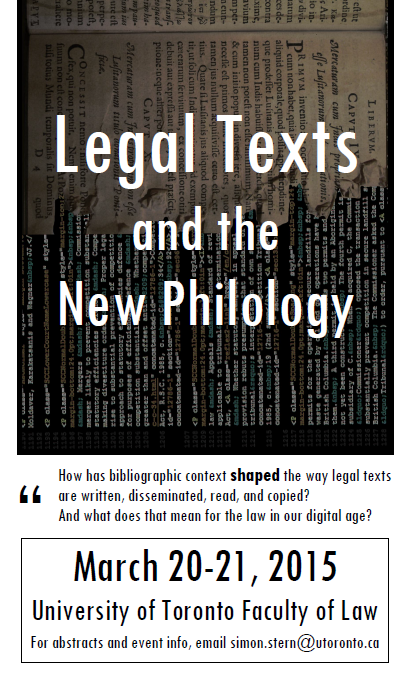Dear readers! Allow me to introduce you to the conference I am co-organizing with Faculty of Law Professor Simon Stern. Consider this a sneak preview before your inbox is bombarded by the relevant listservs.
The conference title is “Legal Texts and the New Philology.” Its focus is on an exciting topic, and one that has come up in a number of my classes so far (including the usual suspects like Law and Literature and Legal Archaeology, but also first-year Contracts and Administrative Law). The conference seeks answers to this question:
“How has bibliographic context shaped—and how does it continue to shape—the way legal texts are written, disseminated, read, copied, de- and re-contextualized, and otherwise used by their audiences?”
The New Philology
Scholarship on legal texts has yet to reflect the work of literary critics such as Jerome McGann, who, in the 1980s, introduced the notion of the “textual condition.” This is the idea that strings of words, and the concepts and ideas they convey, are inextricably linked to the medium in which they are embedded, and are not simply free-floating communications that persist over time, bare of their means. Some philologists employ textual criticism to highlight these ideas, some analyze texts mainly through the lens of textual production and socio-history, and some connect their analyses to more hermeneutical investigations.
The Conference
The conference, held March 20-21, 2015, will serve to focus and intensify the debate over the changing nature of editorial approaches to legal texts. This is important to the fields of legal history, legal theory, and legal text editing, and is of particular significance now, as we interpret texts in today’s digital environments (and as legal texts are more and more frequently encountered exclusively online, and by-and-large in contexts shaped by commercial entities).
If the basis of our legal system depends on communications of authority, and if, as the work of literary critics suggests, the mode of transmission of this authority is unstable, then the work of the new philologers has great significance for legal theorists and practitioners alike.
By showing that law is a product of its own materiality—and is therefore authored by web designers and database engineers and well as by legislators, judges and clerks—we hope to highlight an overlooked aspect of the legal textual condition and bring these insights to lawyers, jurists, and emerging scholars who attend the conference.
 Legal Texts Poster (click to launch PDF)
Legal Texts Poster (click to launch PDF)
Note: some of the text of this post was lifted from a summary I co-authored with Professor Stern.
